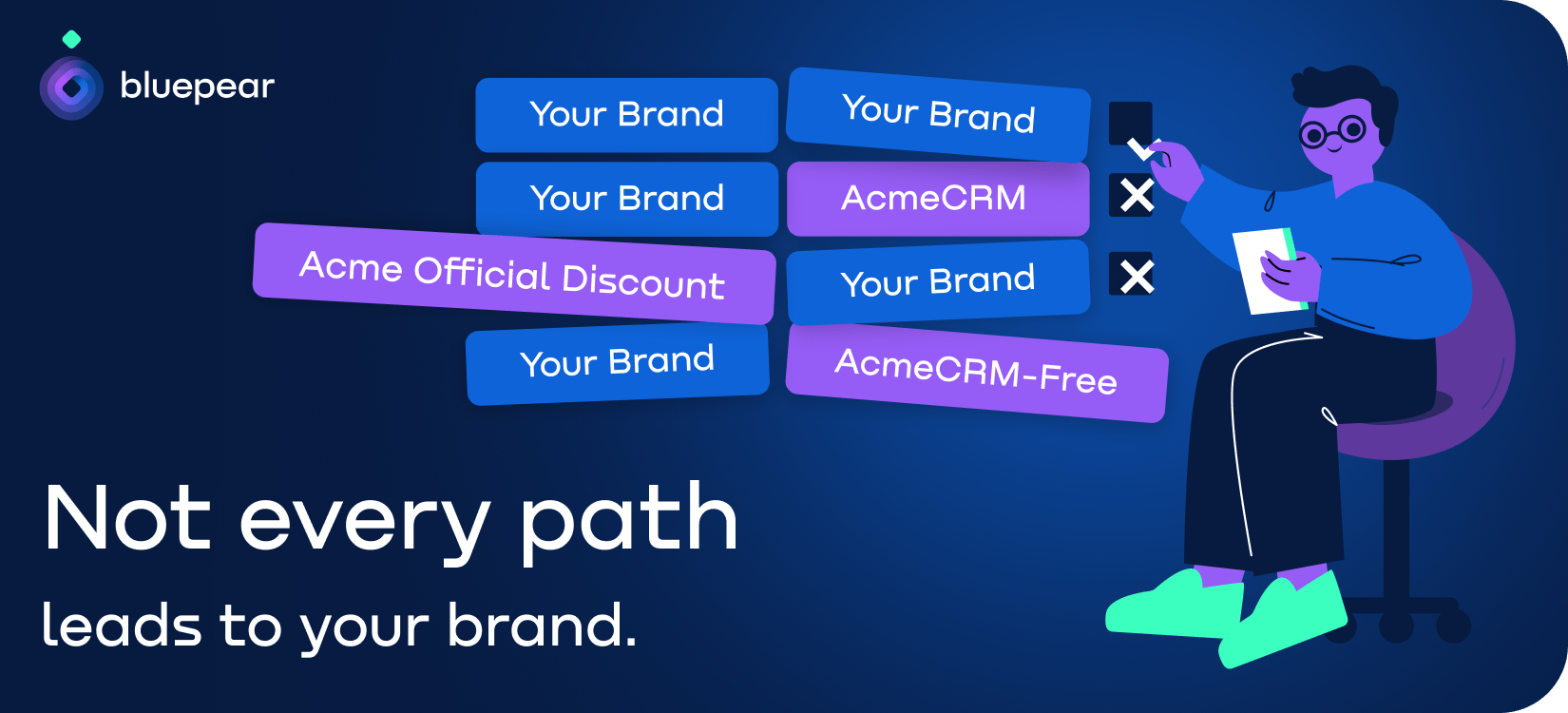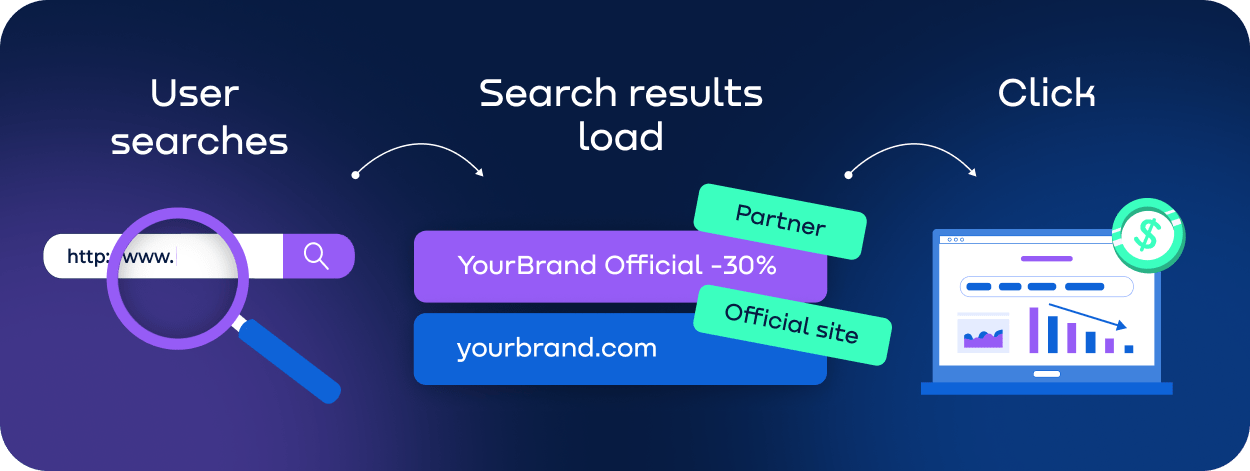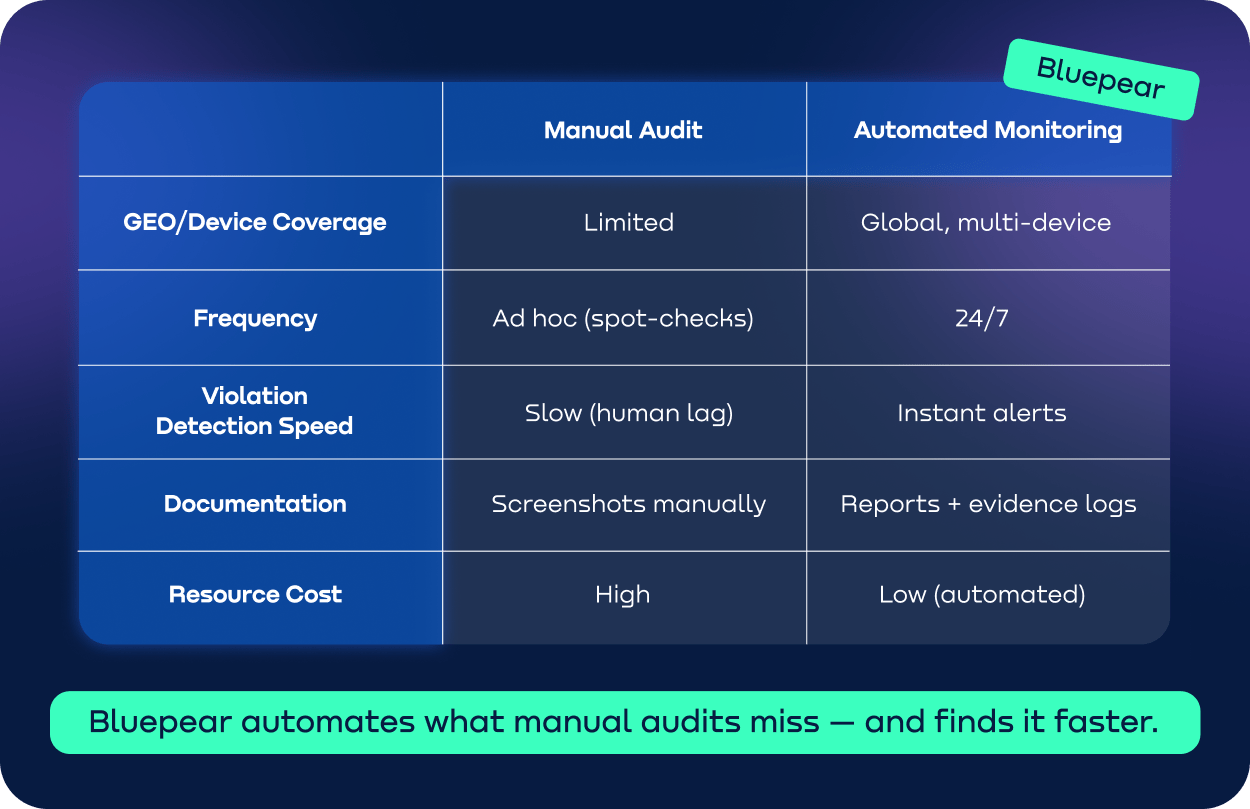
Contents
Introduction
In today’s digital landscape, a company’s online visibility plays a critical role in customer acquisition, reputation management, and competitive positioning. One of the most effective tools for safeguarding this visibility is search monitoring — the process of tracking how your brand, products, and associated keywords appear in search engine results.
Search monitoring services allow businesses to analyze search engine activities across multiple regions, devices, and platforms, providing valuable insights into both organic and paid search performance. More importantly, it helps identify unauthorized activities that may harm brand integrity, such as deceptive ads, counterfeit promotions, or unapproved affiliates misusing branded keywords.
How Brands Suffer from Unethical Advertising and Competitive Abuse
Unauthorized use of brand names in digital advertising is a growing concern for many businesses. In many cases, consumers are unaware they are engaging with unofficial sources, which can lead to negative experiences, reduced conversion rates, and long-term reputational damage.
The most common problems companies face include:
• Unauthorized brand usage. Third parties use brand names or trademarks in ads or search listings without permission, often to capture traffic unfairly. Bluepear continuously scans paid search results across multiple geos and devices, detecting any unauthorized use of your brand in ad copy or URLs. It identifies violators in real time and provides clear evidence, allowing your team to take immediate action or escalate through platform complaints.
• Coupon abuse. Unofficial coupon websites promote misleading or expired discount codes, damaging trust and conversion rates. Bluepear identifies coupon websites bidding on your brand keywords or misusing your brand name in search results. It flags these activities, helping you enforce promotional policies, protect margins, and maintain consistent user experience across acquisition channels.
• Trademark infringement. Affiliates or competitors violate intellectual property rights by using protected brand names in ways that confuse consumers or undermine official marketing efforts. Bluepear detects trademark violations in Google Ads and other paid search environments by monitoring how your protected terms are used in real ad copy. It highlights cases of TM abuse, generates documentation for enforcement, and supports your team in submitting complaints through official channels like Google’s trademark protection process.
Such activities not only dilute marketing ROI but also expose brands to reputational, legal, and financial risks.

Existing Search Monitor Search Tools
To address these issues, companies increasingly turn to specialized tools and search monitoring services. Solutions, like Bluepear, offer robust capabilities to monitor my trade mark usage in search results, track paid and organic listings, and detect trademark violations.
These platforms provide real-time data on how brands appear in search environments, enabling businesses to take proactive measures against unauthorized activities. Features often include competitive ad tracking, detection of affiliate violations, monitoring for coupon abuse, trademark protection, and enforcement support.
What Are Paid Search Monitoring Services?
Search monitoring services are specialized solutions that allow companies to track, analyze, and manage how their brand, products, and keywords appear in search engine results, both in paid ads and organic listings. These services provide businesses with visibility into competitive activity, unauthorized use of brand assets, and potential violations of advertising guidelines.
At their core, search monitoring platforms work by continuously scanning search engines (for example, Bluepear works with Google, Bing, and others) across different geographies, devices, and user profiles. They collect real-time data on keyword rankings, ad placements, and brand mentions, offering companies a clear view of the search environment from both a consumer and competitor perspective.
The process typically includes:
• Automated keyword scans
• Detection of unauthorized ads
• Competitor activity insights
• Affiliate compliance checks
• Geographic and device-based testing
This data enables businesses to take action, whether by optimizing their search strategies, addressing compliance violations, or protecting their intellectual property.
Who benefits from search monitoring services? Search monitoring is relevant to a wide range of businesses, particularly those with significant online visibility or investments in digital advertising. Key stakeholders include: brands, advertisers, affiliate programs, e-commerce companies, agencies, and marketing teams.

Scenarios Where Search Monitoring Helps
Trademark Protection. A global brand discovers competitors or affiliates bidding on its trademarked terms in Google Ads, driving up costs and confusing customers. Search monitoring detects these violations, allowing the brand to take corrective legal or contractual action. Bluepear automatically identifies trademark abuse in real-time across search ads. It captures evidence such as screenshots, ad copy, and landing URLs, allowing brands to take immediate legal or contractual action. The platform also supports structured documentation for submitting formal Google Ads trademark complaints.
Regional Online Brand Monitoring. An international brand notices different unauthorized activities across markets. Search monitoring services run location-specific scans to uncover issues like localized trademark abuse or misleading regional promotions. BluePear simulates user behavior across countries, languages, and devices, providing geo-targeted search results and detecting region-specific brand abuse. This allows global teams to uncover local violations, such as unauthorized partners running promotions or resellers misusing the brand in specific geos.
PPC Optimization and Protection. A business investing heavily in paid search wants to ensure only authorized ads appear for its brand name. Search monitoring detects unauthorized ads and helps maintain ad relevance and cost efficiency. Bluepear continuously monitors branded PPC placements, flagging unauthorized ads from competitors, affiliates, or third parties. It provides early warnings and detailed reports, helping teams reduce wasted ad spend, protect brand positioning, and maintain campaign efficiency.
Key Objectives to Monitor My Trade Mark
Search monitoring services play a crucial role in protecting brand integrity, ensuring legal compliance, and optimizing advertising performance. For companies operating in highly competitive digital environments, structured search monitoring helps safeguard both reputation and revenue. The core objectives of brand search monitoring typically include:
1. Brand Compliance Monitoring
Protecting a brand from unauthorized or unethical use is a primary function. This involves tracking how a brand name, trademarks, and key messaging appear across search engine results and digital advertisements. Bluepear scans paid search results across multiple geos, devices, and times of day, using automated crawlers to identify ads containing branded keywords, suspicious copy, or misleading messaging. Through continuous monitoring, companies can detect unapproved use of brand names in paid ads, misleading messaging that may confuse consumers, and unauthorized third-party promotions claiming association with the brand.
2. Monitoring Trademark Violations
Trademark infringement in paid search campaigns is a common challenge, especially for well-known brands. Competitors, unauthorized affiliates, or resellers may bid on trademarked terms to capture traffic intended for the official brand, leading to increased cost-per-click (CPC) for legitimate ads, customer confusion and misdirected traffic, legal exposure and loss of brand exclusivity. Bluepear continuously monitors branded keywords in Google Ads and other search platforms, identifying ad creatives that include trademarked terms. It flags any unauthorized usage. This allows companies to take action to protect intellectual property and ensure fair competition.
3. Affiliate and Coupon Compliance
Affiliate programs and promotional partners are valuable marketing channels, but also present risks if not properly controlled. Search monitoring is essential for enforcing affiliate agreements and preventing unauthorized promotions, including coupon abuse, affiliate hijacking of brand keywords in paid search, and violations of geographic, messaging, or bidding restrictions. Bluepear identifies affiliate-driven ads that bid on brand terms without authorization and detects coupon-related violations by scanning search engine results pages and affiliate behavior across markets. By monitoring affiliates’ search activities, brands can ensure partners adhere to agreed terms, prevent revenue leakage, and maintain consistency in consumer messaging.
An effective search monitoring strategy integrates brand protection, trademark enforcement, and affiliate compliance into a single, proactive process. For companies relying on PPC, affiliate marketing, or strong brand recognition, these measures are essential to reduce risks, optimize ad spend, and safeguard brand equity in search environments.
What Monitor Search Tools Help?
Search monitoring requires more than manual checks or basic search engine alerts. To protect brand integrity and maintain visibility, companies rely on specialized platforms designed to track search environments at scale. These tools help detect unauthorized activities, monitor competitors, and ensure compliance with advertising and affiliate policies.
One of the widely recognized platforms is The Search Monitor. It provides businesses with the ability to monitor paid search ads, keyword usage, and brand mentions across major search engines. The platform focuses on detecting unauthorized ads, identifying trademark infringements, and ensuring partner or affiliate compliance in digital campaigns. However, at Bluepear, we’ve built the system to prioritize real-time detection, geo-specific ad monitoring, and affiliate-level attribution, making it especially effective for industries where brand bidding and trademark abuse are frequent and highly localized.
Most search monitoring services are designed to solve a range of challenges for brands and advertisers. Their core tasks typically include detecting unauthorized use of branded terms in ads, monitoring my trade mark violations with tools like Google search monitor product, tracking competitor behavior in search results, and ensuring affiliate promotions follow established guidelines. Some tools also provide insights into how brand messaging appears across different regions and devices.
In addition to The Search Monitor, there are several strong the searchmonitor alternatives available. Adthena, for example, offers AI-powered search intelligence with detailed competitor search engine tracking. BrandVerity focuses heavily on detecting trademark bidding and affiliate compliance issues, making it a popular choice among global brands. AdPolice specializes in monitoring paid search campaigns and affiliate activity, providing real-time alerts and customizable reports. Another notable option is Bluepear, which provides advanced detection of PPC trademark violations, affiliate ad hijacking, and localized search tests, particularly valuable for industries facing high rates of brand abuse.
For a deeper comparison of AdPolice alternatives, BrandVerity competitors, and Adthena alternatives, explore our detailed guide that breaks down features, strengths, and pricing of these tools.
Choosing the right paid search monitoring services depends on several business-specific factors. Companies operating in competitive industries like iGaming often require advanced detection features, including affiliate abuse prevention and trademark enforcement. Global brands need platforms that support multi-region monitoring and localized testing to reflect real search conditions across different markets.
Affiliate-driven businesses should look for solutions that provide comprehensive partner compliance monitoring, helping enforce program rules and reduce revenue leakage. It is also important to consider the scope of search engine coverage — the best tools monitor not only Google but also platforms like Bing and other localized search engines.
Finally, reporting and alerting capabilities play a crucial role. Effective paid search monitoring services provide real-time alerts, actionable reports, and clear data that enable marketing teams to respond quickly to violations and protect brand presence.
In summary, while there are several monitor search tools available, businesses should evaluate their unique needs, industry challenges, and operational scale to select a solution that delivers both brand protection and marketing performance insights.
How Brands Can Protect Themselves: Google Search Monitor Product
Search engine brand protection requires both proactive monitoring and a clear response strategy. Even with advanced search monitoring services in place, companies must understand the formal processes available to address trademark misuse and unauthorized advertising.
One of the most effective ways to protect brand terms is through filing trademark violation complaints with Google Ads. Google search monitor product provides a structured process for brand owners to report unauthorized use of their trademarks in paid search advertisements. By submitting a formal complaint, businesses can request the removal of ads that misuse protected brand names or trademarks.
In addition to handling individual complaints, brands should familiarize themselves with Google’s advertising policies related to search engine brand protection. Google generally restricts the use of trademarks in ad text when requested by the trademark owner, particularly in cases where the use could mislead consumers. However, policies may vary based on geographic regions and the nature of the complaint, so businesses must ensure their trademark registrations are up to date and properly documented.
If competitors, affiliates, or unauthorized third parties are using your brand name in their ads, the recommended steps are clear:
-
Document the violation
-
Check existing agreements
-
Submit a trademark complaint to Google
-
Monitor my trade mark continuously, even after submitting complaints
-
Seek legal support if needed:
Ultimately, protecting a brand in the search ecosystem requires a combination of active monitoring, understanding platform policies, and taking prompt action when violations occur. By following these steps, companies can reduce reputational risks, lower advertising costs, and maintain control over their brand presentation in search environments.
How to Choose Among The Search Monitor Competitors
Selecting an effective search tool to monitor my trade mark is a strategic decision that depends on the specific needs of the business, industry challenges, and available resources. With a variety of the search monitor competitors offering different levels of coverage and functionality, companies should approach this choice systematically. The key criteria to consider when evaluating paid search monitoring solutions include:
Scope of Monitoring
The monitor search tool should provide coverage across both paid and organic search environments, including major search engines like Google, Bing, and, where relevant, local or niche platforms. Brands with global operations should prioritize solutions that offer multi-country and multi-language monitoring. Bluepear offers geo-targeted search simulations across dozens of countries, languages, and devices. It captures how your brand appears in different regions — including local violations that are often missed by global-only tools — ensuring full visibility into both paid and organic environments.
Detection Capabilities
Advanced detection features such as affiliate ad hijacking alerts, trademark violation identification, and real-time competitive tracking are essential for businesses facing high rates of brand misuse or aggressive competition. Bluepear is built to detect affiliate hijacking and trademark violations in real time. It logs every incident with evidence (screenshots, URLs, timestamps), identifies patterns across campaigns, and attributes activity to specific partners or sources, giving teams a clear path for enforcement or escalation.
Price vs. Functionality
Cost is always an important factor, but businesses should carefully assess the trade-off between price and functionality. Entry-level tools may offer basic monitoring at a lower cost, but could lack advanced features needed for industries with higher brand protection requirements. On the other hand, premium solutions often provide extensive capabilities, but may exceed the budget for smaller organizations or those with limited monitoring needs. BluePear is designed to deliver enterprise-level features — including real-time scanning, affiliate tracking, and geo-based search testing — at a flexible price point. Our modular pricing model makes it accessible for both mid-size teams and larger organizations, without compromising on detection quality or coverage.
For some companies, a targeted, cost-effective monitor search tool that covers essential keyword and ad monitoring may be sufficient. Others, particularly in highly competitive sectors such as iGaming, may require more comprehensive solutions with advanced detection of trademark abuse, affiliate compliance, and global search testing. Also, look at the search monitor pricing. This could be the deciding point in choosing a service.
Conclusion
Paid search monitoring is no longer optional for businesses that rely on digital advertising, strong brand identity, or affiliate partnerships. It has become a necessary part of maintaining marketing efficiency, enforcing compliance, and protecting intellectual property.
The most effective brand protection strategies include continuous monitoring of branded keywords across major search engines, detecting unauthorized ads or trademark misuse, and ensuring compliance among partners and affiliates. In addition, submitting trademark violation complaints to the Google search monitor product and other platforms remains a critical legal search monitor tool for addressing unauthorized brand use.
For companies looking for a reliable, real-time solution, BluePear offers advanced search monitoring designed to detect trademark abuse, prevent affiliate ad hijacking, and provide localized search visibility across global markets.
Among available solutions, BluePear stands out as the most effective tool for these specific needs. This makes it particularly valuable for brands operating in iGaming across multiple regions, where timing, accuracy, and enforcement speed are critical.

